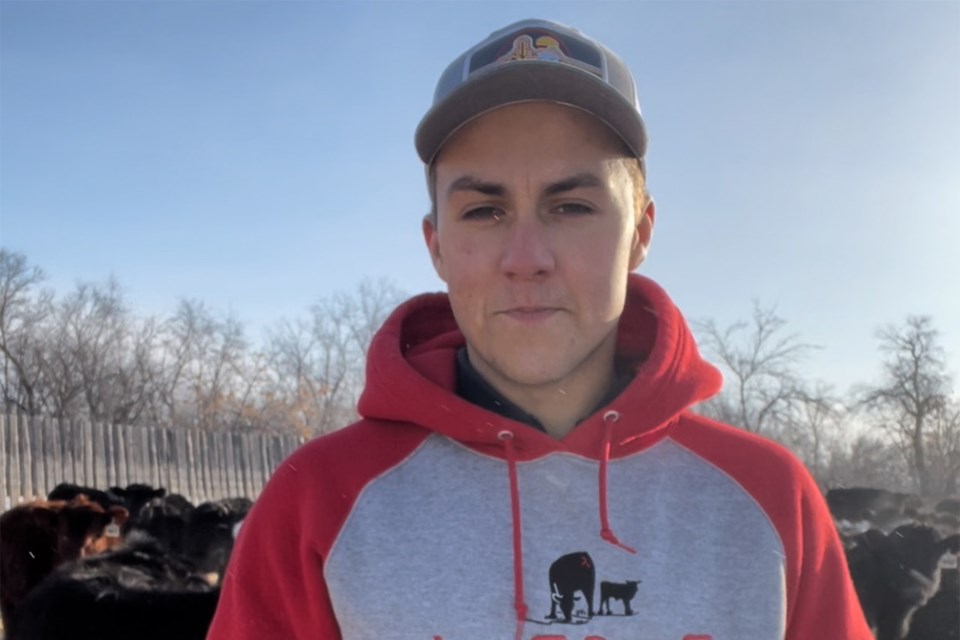SASKATOON — Raising a healthy cattle herd involves providing healthy and abundant plants for cattle to eat, a process called forage production.
Judson Christopherson, a graduate student at the University of Saskatchewan (USask), is investigating the levels of carbon emissions from the forage production process and how it affects the environment and economy. His research aims to develop better policies that support beef producers in their industry.
For the cattle industry, the world’s changing climate has become a major consideration for producers and consumers alike. Concerns about greenhouse gas emissions are often a topic of discussion in the Saskatchewan agricultural sector, especially as it relates to environmentally friendly and sustainable production practices.
Christopherson has dedicated his master’s project to determining the amount of carbon emissions produced in Saskatchewan from growing forage crops, and to developing an economic indicator of this impact for practical use in policy development. The project is supervised by College of Agriculture and Bioresources professor and Agri-Food Innovation and Sustainability Enhancement Chair, Dr. Stuart Smyth (PhD).
“A growing narrative amongst some academics and political figures has negatively portrayed beef production regarding environmental sustainability,” said Christopherson, who is pursuing his master’s degree in through the USask College of Agriculture and Bioresources. “Recent research discusses the importance that these emissions be viewed as a natural cycle, with methane being converted to carbon dioxide and then returned to soils via plant growth.”
Christopherson is in the early stages of his research, but initial results from reviewing recent research demonstrate that the soils used in forage production have high carbon storage potential – good news in that storing carbon in soil can lead to healthier plant production and keeps carbon dioxide out of the atmosphere.
Christopherson said his research is applicable to consumers, the general public, and to policy groups that seek to understand the environmental impact of beef production. The research will also serve as a great tool to help producers recognize how production autonomy, sustainability, and financial stability fit into their production processes.
“Paired with the limited use of agricultural inputs, tillage, and machinery, the carbon emissions from forage production appear to be low,” said Christopherson. “The net [carbon] emissions from the forage production cycle represent a large portion of the total emissions of beef production, and furthering the understanding of this topic will add to the information available to consumers.”
Right now, Christopherson is focused on administering surveys to producers and gathering data that will document their forage production processes.
“This survey will gather information on every operation a producer performs in establishing, growing, maintaining, harvesting, and transporting a forage crop,” said Christopherson. “Additionally, the research focus on forage production as a standalone practice in a single province is a new step forward in the literature.”
Christopherson notes that his research is unique in that it involves surveying beef producers directly and focuses on actual forage production, instead of relying on simulation models that are often inaccurate when compared to real-world production practices. He hopes that demonstrating how forage production relates to the economics and sustainability of the beef industry will help policymakers to develop a better understanding of this piece of the beef production puzzle in a way that benefits all.
After the survey portion of the research concludes in late 2023, next steps include “carbon modelling, correlating emission changes with changes in production practices, and providing an economic value” of the carbon stored and emitted from soils during forage production.
“As a cattle producer, I am driven to ensure the practices implemented on our operation uphold environmental sustainability while driving economic success,” said Christopherson. “Beyond this, I strive to tell the story of our ranch and operations like it to uphold the reputation of Saskatchewan’s agriculture industry and foster the growth of the most sustainable agriculture sectors across the globe.”
The research has been supported by the Saskatchewan Cattlemen’s Association.
— Submitted by USask Media Relations




